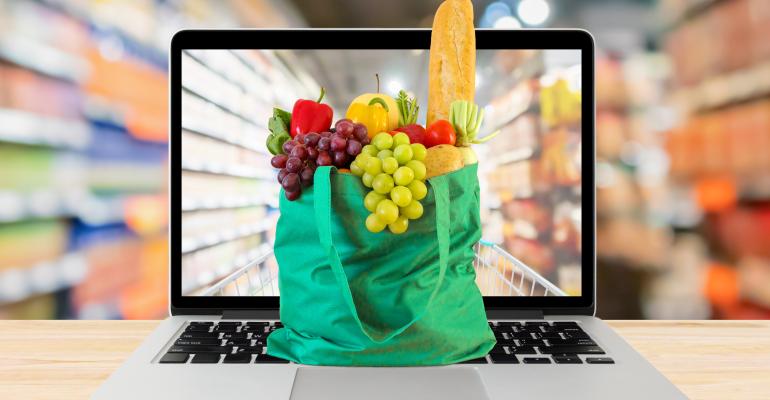Grocery e-commerce sales jumped 2.4% in December
Online U.S. grocery sales totaled $9.1 billion in December, up 2.4% from $8.9 billion in the year-earlier period, according to the monthly Brick Meets Click/Mercatus grocery shopping survey.
Driving the growth was a combination of more households buying groceries online and slightly higher order values.
Pickup, which includes instore, curbside, lockers and drive-up, accounted for $4.4 billion in sales, a 14.7% increase. Delivery purchases from first or third-party providers, including store employees and such services as Instacart and Shipt, totaled $3.2 billion, down 1.8%, while ship-to-home from parcel carriers generated revenues of $1.5 billion, a 16.2% decline.
More than 50% of U.S. households ordered groceries online during the month, up 4% versus a year earlier, with almost 5% additional monthly active users opting for pickup, and more than 8% fewer using ship-to-home. Delivery user growth was slightly positive.
Mass retailer was the liveliest sector, with the base of monthly active mass users expanding nearly three times faster than the 7% gain of active grocery users.
“The investments that mass retailers have put into their pickup services are a significant driver of the format’s gains,” David Bishop, partner of Brick Meets Click, a Barrington, Ill.-based analytics and strategic insight firm, said in a statement. “And while lower prices are a contributing factor in the growth of the mass monthly active user base, being able to more consistently execute at the store level is also helping to strengthen retention and engagement with existing customers, especially when compared to grocery.”
Cross-shopping also is strong, as more than 30% of monthly active users brought groceries online during the month from both grocery and mass retailers, an increase of about 1.3% from a year earlier.
Yet, the likelihood that customers will use the same service again within the next month dropped 6.7% to 56%, with repeat intent rates down for both mass and grocery. Yet, mass has gone from parity with grocery to more than a 10-point advantage in retaining customers over the past year.
Overall order frequency slid 7% but was up 3% for mass retailers and down 7% for grocery, with ship-to-home and delivery having double-digit declines and pickup registering a slight increase. Total spending per order grew about 6%, with grocery and mass generating increases of 4% and 12%, respectively.
“Regional grocers have many opportunities to improve the customer experience and the profitability of operating an online grocery service today,” Sylvain Perrier, president and chief executive officer at Mercatus, a Toronto-based grocery e-commerce software provider, said in a statement. “From our ongoing work and research into online customer behavior, we’ve learned how important it is to develop a strategy that makes sense both financially and operationally, and that builds on how a grocer is positioned in the market and with their core customers.”
The survey was conducted in late December with 1,715 adults who participate in their household’s grocery shopping. Responses are geographically representative of the U.S. and weighted by age to reflect the national population of persons 18 years and older.

